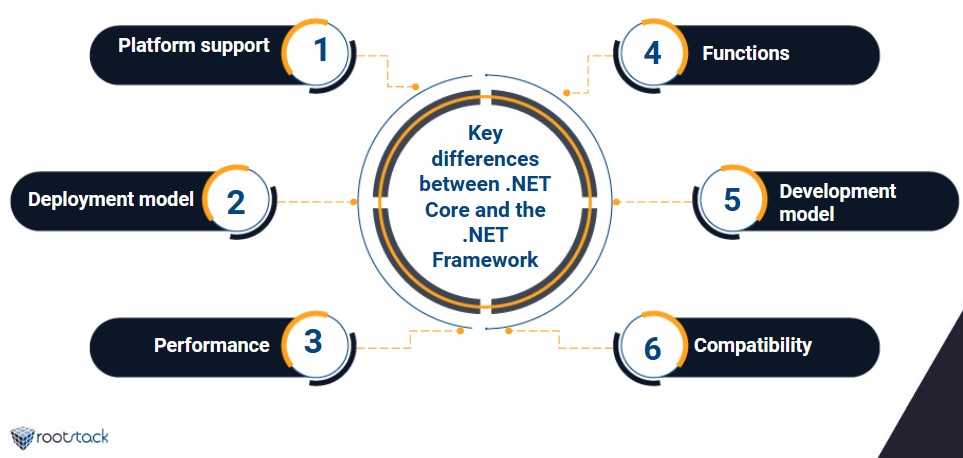Key distinctions between .Net core and .Net framework
July 17, 2023
Table of contents
Quick Access
Microsoft is one of the most well-known names in the technology business. Their domain has progressed to the point that they have developed their own framework: .Net, which is suitable for web applications.
Microsoft's .NET framework allows you to create web apps and services for Windows, Linux, macOS, and Docker. C#, F#, or Visual Basic can be used to create all .NET apps.
What exactly is .Net Core?
.NET Core is a cross-platform open-source framework for developing modern cloud-based web apps, console apps, and microservices. It enables developers to utilize the development tools and languages of their choice, such as C#, F#, and VB.NET.
.NET Core is compatible with a variety of platforms, including Windows, macOS, and Linux, and is suited for containerized apps and microservices architectures. It provides a runtime, libraries, and tools that make it simple for developers to build and distribute applications. Because of its flexibility, performance, and scalability, .NET Core is becoming increasingly popular.

But are these two technologies interchangeable?
In many ways, .NET Core and the .NET Framework are comparable, but they are not the same. The.NET Framework is a mature platform that has been available for more than a decade and is primarily designed to run on Windows. .NET Core, on the other hand, is a cross-platform open source framework built to run on several operating systems, including Windows, macOS, and Linux.
The .NET Framework includes more functionality and offers a comprehensive development environment for creating desktop applications, Windows services, and online applications. .NET Core, on the other hand, is lighter, faster, and better suited to the development of new cloud-based applications, microservices, and containerized workloads.
Another notable distinction between these two frameworks is that the .NET Framework requires the .NET runtime to be installed on the target machine in order for the applications to operate. .NET Core, on the other hand, contains a self-contained, deployable runtime that can be bundled with your application and delivered to any machine without requiring a separate installation.

The main distinctions between .Net core and .Net framework
Here are the primary distinctions between .NET Core and .NET Framework:
- Platform support: The .NET Framework is solely designed to run on Windows, whereas .NET Core is designed to run on several operating systems, including Windows, macOS, and Linux.
- Deployment approach: .NET Core programs can be delivered using a self-contained deployment mechanism that includes the app's runtime and libraries. .NET Framework apps, on the other hand, require the .NET runtime to be installed on the target machine.
- Performance: Because of its lightweight architecture, .NET Core is faster than the .NET Framework, making it an excellent choice for developing high-performance applications.
- API functionality: The .NET Framework provides more API functionality than .NET Core. .NET Core, on the other hand, has a modern API that is geared for cross-platform development, and its APIs are constantly growing.
- Development Model: .NET Core provides a modular development model that allows you to select the framework components that you require. The .NET Framework, on the other hand, offers a monolithic development paradigm that requires you to install the complete framework.
- Compatibility: Due to differences in platform and deployment model, the .NET Framework and .NET Core are not fully compatible with each other, although the .NET team has made significant progress in closing this gap.

Which is preferable for a software development project?
It is dependent on your specific needs and use situation. If you need to use some of the legacy features and APIs of the .NET Framework and are targeting a certain platform, such as Windows, it may be the best option for you.
.NET Core, on the other hand, is the greatest solution for developing apps that are cross-platform, quick, and optimized for cloud deployment. .NET Core is a lightweight, flexible framework that allows you to create modern microservices and containerized applications.
In short, if you're starting a new project, you should use.NET Core since the benefits of cross-platform support, improved performance, and a modern development style outweigh the disadvantages of its narrower feature set. However, if you are working with older programs that require specific.NET Framework features or need to interact with other Windows-based tools, the.NET Framework may be the best solution for you.
We recommend you on video
Related Blogs

Rootstack asistió a eMerge Americas 2024 en Miami

Cómo integrar UiPath RPA con una base de datos

Servicios de desarrollo de Magento para la industria de la salud
Las mejores prácticas para contratar a un desarrollador Drupal

5 pasos de la implementación de UiPath RPA

